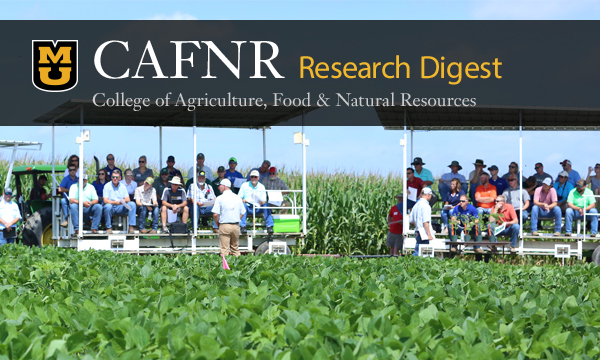|
Manufacturing initiative task force launched
The Food, Beverage and Forest Products Manufacturing Initiative, one of the Grand Ideas in the recently launched CAFNR Strategic Plan, is moving forward. Lt. Gov. Mike Kehoe signed an executive order establishing the Missouri Food, Beverage and Forest Products Manufacturing Task Force at Central Missouri Meat and Sausage in Fulton on Friday, June 28. CAFNR Vice Chancellor and Dean Christopher Daubert will be part of the task force, which Kehoe is chairing.
CAFNR faculty members have received the following recent grants (listed by Principal Investigator):
Thomas Bonnot, Estimating Abundance and Habitat Associations of Birds in Eastern National Forests, 4/19/2018 – 12/31/2021, $44,593, Forest Service
Kevin Bradley, Monsanto Service Order #113, 4/1/2019 – 3/31/2020, $7,315, Monsanto
Derek Brake, Increasing Soybean Use In Cattle Diets: Growing Beef Calves and Lactating Dairy Cows, 5/1/2019 – 6/30/2020, $51,295, Missouri Soybean Merchandising Council
Deborah Finke, Optimization of Artificial Diet for Rearing and Toxicity Assays with Western Corn Rootworm, 8/1/2017 – 6/30/2021, $143,227, Agricultural Research Service
Hong He, Predicting Forest Landscape Change to Support Environmental Analyses And Decision Making, 4/11/2018 – 9/30/2021, $23,004, Forest Service
James Heiser, Monsanto Service Order #109, 4/1/2019 – 3/31/2020, $8,820, Monsanto
Nicholas Kalaitzandonakes, Maintaining Market Access by Engaging Regulators and Influencers, 6/1/2019 – 9/30/2019, $37,500, US Soybean Export Council
Anne McKendry, Fusarium Head Blight Research in Soft Red Winter Wheat, 5/27/2018 – 5/26/2020, $102,133, Agricultural Research Service
Gerald Miller Jr., Evaluation of Biochar for Disease Suppression and Turfgrass Quality, 5/10/2019 – 12/1/2019, $12,000, Safety Tree Service
Ron Mittler, Integrating ROS, redox and cell metabolism across plant and animal cells, 9/1/2018 – 7/31/2020, $664,737, NSF Division of Molecular and Cellular Biosciences
Robert Myers, Cover Crop Germplasm and Breeding in Support of New Cultivar Development, 3/1/2018 – 2/29/2020, $50,000, Samuel Roberts Noble Foundation
Rebecca North, Missouri Streams FY2020, 7/1/2019 – 6/30/2020, $8,220, Missouri Department of Conservation
Rebecca North, Evaluating Tunnel Dam’s Effects on Flows, Habitats, and Aquatic Biota in the Niangua River System, 7/1/2017 – 6/30/2020, $5,170, Missouri Department of Conservation
Rebecca North, Ozark National Scenic Riverways, 7/1/2019 – 6/30/2020, $1,500, National Park Service
Craig Paukert, Edward K. Love Foundation Fellowships, 6/1/2019 – 5/31/2020, $25,000, Edward K. Love Conservation Foundation
Craig Paukert, Determining Electrofishing Immobilization Thresholds of Smallmouth Bass, Blue Catfish and Flathead Catfish: A Critical Step to Develop a Standardized Sampling Protocol, 7/1/2015 – 6/30/2020, $39,584, Missouri Department of Conservation
Craig Paukert, Evaluation of the Bonus Fishery Created by The Low-Density Stocking of Striped Bass (Morone Saxatilis) in Bull Shoals Lake, 7/1/2018 – 6/30/2020, $163,329, Missouri Department of Conservation
Rocio Rivera, Use of a Bovine Overgrowth Syndrome to Characterize the Molecular Etiology of BWS, 3/1/2018 – 2/28/2023, $650,000, National Institute of Food and Agriculture
Kenneth Schneeberger, West Africa Regional Phytosanitary, 9/15/2018 – 9/30/2019, $90,000, Foreign Agriculture Service
Jon Simonsen, Agricultural Education In-Service Education Project, 7/1/2019 – 6/30/2020, $80,728, Missouri Department of Elementary and Secondary Education
Reid Smeda, Monsanto Service Order #110, 4/1/2019 – 3/31/2020, $6,384, Monsanto
Reid Smeda, Monsanto Service Order #111, 4/1/2019 – 3/31/2020, $6,650, Monsanto
Michael Stambaugh, Multiple Treatment Effects of Prescribed Burning and Thinning on Vegetation Development in Oak Woodlands of Kansas, 6/26/2019 – 8/31/2021, $25,000, Forest Service
John Tanner, Inhibition of UDP-galactopyranose mutases from eukaryotic pathogens, 5/1/2018 – 4/30/2020, $119,694, Virginia Tech
Mitchell Weegman, Determining the Feasibility of a Long-Term Color Banding Program to Quantify Individual Decisions and Population Dynamics of Atlantic Brant, 4/1/2019 – 12/31/2020, $83,459, Fish and Wildlife Service
Joanne Whittier, Guidance to Managers for Evaluating Priority Geographies and Watershed Success, 7/1/2017 – 6/30/2020, $93,971, Missouri Department of Conservation
Bing Yang, SECRETome Project: Systematic Evaluation of CellulaR ExporT from plant cells, 2/13/2019 – 7/31/2021, $1,786,049, NSF Division of Integrative Organismal Systems
Provided by the MU Office of Research
|
